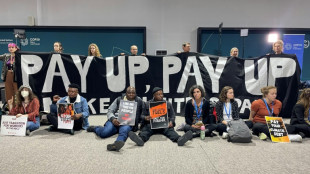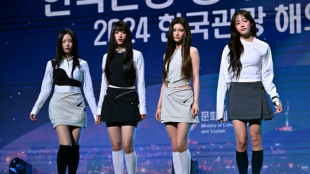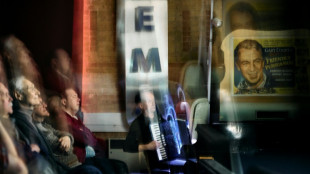
-
 Uganda opposition figure Besigye appears in military court
Uganda opposition figure Besigye appears in military court
-
General strike in Greece against cost of living

-
 UN nuclear chief welcomes Iran's 'concrete step' on uranium stockpile
UN nuclear chief welcomes Iran's 'concrete step' on uranium stockpile
-
Floods to shave 0.2 percentage points off Spain's growth

-
 Argentina's Contepomi makes one change for France Test
Argentina's Contepomi makes one change for France Test
-
'Steep climb' ahead as clock ticks on stalled climate talks

-
 Gatland changes four for Wales clash with South Africa
Gatland changes four for Wales clash with South Africa
-
'Sport will have the last word' as WRC title goes down to the wire in Japan

-
 Western powers move to censure Iran at UN nuclear meet
Western powers move to censure Iran at UN nuclear meet
-
US envoy presses Israel-Hezbollah truce bid in Lebanon visit

-
 'No controversy' around Alldritt exclusion for Argentina Test
'No controversy' around Alldritt exclusion for Argentina Test
-
Stock markets gain, dollar higher before Nvidia earnings

-
 New WHO financing mechanism put to the test
New WHO financing mechanism put to the test
-
Besigye kidnapping: Uganda president's doctor turned rival

-
 Star K-pop producer of NewJeans quits after legal spat with BTS agency
Star K-pop producer of NewJeans quits after legal spat with BTS agency
-
'Eternal' Nadal leaves legacy as he retires from tennis

-
 Vieira takes over at struggling Gerona
Vieira takes over at struggling Gerona
-
Australia's Kerevi banned for Morgan tackle

-
 Bellamy defies 'lunatic' reputation to inspire Wales revival
Bellamy defies 'lunatic' reputation to inspire Wales revival
-
Kremlin says US 'doing everything' to prolong 'war' in Ukraine

-
 Magritte painting nets auction record of $121 million
Magritte painting nets auction record of $121 million
-
Markets fluctuate as traders weigh geopolitical tensions

-
 N. Korea's latest weapon? Bombarding South with noise
N. Korea's latest weapon? Bombarding South with noise
-
'Kidnapped' Uganda opposition figure Besigye to appear at military court: lawyer

-
 Asian markets fluctuate as traders weigh geopolitical tensions
Asian markets fluctuate as traders weigh geopolitical tensions
-
'An inauspicious day': the landmines ruining Myanmar lives

-
 UN to vote again on Gaza ceasefire, US plans unclear
UN to vote again on Gaza ceasefire, US plans unclear
-
Japan's manga powerhouse 'Dragon Ball' turns 40

-
 Japanese, Koreans bottom of global love life survey
Japanese, Koreans bottom of global love life survey
-
Son blames 'mistakes' after South Korea held by Palestine in qualifier

-
 Japan ramps up tech ambitions with $65 bn for AI, chips
Japan ramps up tech ambitions with $65 bn for AI, chips
-
Lights, action, melodrama! Silent films get new reel at London haven

-
 Myanmar led world in landmine victims in 2023: monitor
Myanmar led world in landmine victims in 2023: monitor
-
ICC to sentence Timbuktu war criminal

-
 Ugandan opposition figure Besigye 'kidnapped', says wife
Ugandan opposition figure Besigye 'kidnapped', says wife
-
Australia's Jason Day eyes more major glory after resurgence

-
 Machu Picchu security boosted after visitors spread human ashes
Machu Picchu security boosted after visitors spread human ashes
-
Popovic hails Australia character in 'crazy' World Cup qualifier

-
 Taliban govt clearing 'un-Islamic' books from Afghanistan shelves
Taliban govt clearing 'un-Islamic' books from Afghanistan shelves
-
Argentina beat Peru as Uruguay hold Brazil

-
 Asian markets struggle as traders weigh geopolitical tensions
Asian markets struggle as traders weigh geopolitical tensions
-
Tatum stars as Celtics end Cavaliers unbeaten start

-
 Hurting India under pressure in blockbuster five-Test Australia series
Hurting India under pressure in blockbuster five-Test Australia series
-
'They killed her dream': Israel strike leaves woman footballer in coma

-
 Iraq holds its first census in nearly 40 years
Iraq holds its first census in nearly 40 years
-
Iraqis face tough homecoming a decade after IS rampage

-
 Russian net tightens around last civilians left in eastern Ukraine
Russian net tightens around last civilians left in eastern Ukraine
-
Olympic champion Tebogo aims to inspire next generation of African athletes

-
 Valencia on target as ten-man Ecuador upset Colombia
Valencia on target as ten-man Ecuador upset Colombia
-
'Rust' to premiere three years after on-set shooting


Tech battles to show its worth in Ukraine war crimes probes
Russia's war in Ukraine is still being counted in days, but images of atrocities already number in the hundreds of thousands.
The conflict is the first to throw up such rich evidence in real time, but the sheer volume of material poses a huge challenge for those trying to use it as evidence of war crimes.
"The amount of material that we see, we really haven't seen before," said Hadi al Khatib, whose organisation Mnemonic has gathered around 400,000 pieces of material since February.
Wendy Betts, whose eyeWitness to Atrocities group has a bespoke app to allow NGOs to gather evidence, is equally deluged.
"The last time I looked, we had roughly as much in the last six weeks as we normally would get globally in six months," she told AFP.
International experts are part of a plan unveiled by Ukraine's President Volodymyr Zelensky for a "special mechanism" to probe thousands of allegations of war crimes.
Betts has already handed some footage to Ukrainian prosecutors and Khatib has had to partner with other groups to process his material.
But for all the benefits of technology, this kind of footage has so far been prominent in only a handful of court cases.
Ukraine could well be the coming-of-age for technology-led evidence gathering.
- Training AI -
Khatib cut his teeth on the Syria war, where his team is still sifting an archive of four million records -- he reckons only about five percent has been verified.
They are training artificial intelligence (AI) software to recognise items like Russian cluster bombs to allow that footage to be prioritised.
But it is slow progress and ultimately each record needs to be verified by a human.
"With technology, we are really not there yet, but we are trying," he told AFP.
Khatib initially set out to use the material for advocacy and as a memorial, which requires only that the footage is what it purports to be.
But using footage to build a legal case is different.
It must be proved that nothing could have happened to the footage all along the evidence chain.
The eyeWitness app was designed especially for this, storing all the metadata securely inside the app.
"We can't verify anything that's already been taken on social media," said Betts, "the footage has to be taken using the camera app".
Her main challenge is to build trust among the NGOs and activists who might use the app.
In Ukraine, eyeWitness has already been working with people in the eastern conflict areas for five years, so they have a head start.
And both Betts and Khatib stress how the tech-savvy nature of Ukraine is helping their efforts hugely.
- 'Two-edged sword' -
Activists and investigators have learnt a lot since the civil war in Syria where smartphones were used for the first time en masse to document atrocities.
"The concept of a citizen investigator or citizen engagement in the investigative process... that really emerged in Syria in 2011," said Bill Wiley, a Canadian who has been investigating war crimes for 25 years.
He has since worked on the so-called Islamic State's brutal campaign in Syria and Iraq, when social media was widely used by the militants.
His foundation, the Commission for International Justice and Accountability (CIJA), is still scouring thousands of smartphones and computer hard drives for usable information from the IS conflict.
"Modern technology and its ubiquitous use in conflict zones is, from a narrow criminal investigative perspective, very much a two-edged sword, and mostly cutting the wrong way," he said.
Both he and Khatib contrast the volume of material with the ability of software to provide accurate analysis.
Wiley suggested investigators needed to be picky in what footage they use, flagging the example of an attack on a theatre in Mariupol on March 16 where hundreds of civilians are thought to have been killed.
"You don't need a photograph of the aircraft circling the target before the bomb was dropped," he said.
Instead, he will be looking to safeguard any information that could link such attacks to whoever ordered them, whether that is phone call intercepts, email chains or old-fashioned paper trails.
But the investigators all agree that they are part of a team with similar goals.
"All of these pieces of information are going to be required to put this gigantic evidentiary puzzle together," said Betts.
And they all believe that ultimately there will be accountability.
"It may take some time, but we will see arrest warrants issued against various Russian leaders," said Wiley.
H.Romero--AT
